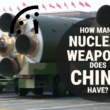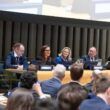Expanded powers, greater security
By Sunday Jonah, May 24, 2012
One thing on which all participants in this Roundtable agree is that certain elements of the noproliferation regime require fundamental strengthening. In order to achieve this, the Roundtable authors have proposed wide-ranging ideas such as altering the structure and expanding the powers of the International Atomic Energy Agency (IAEA); allowing some countries that stand outside the Nuclear Non-Proliferation Treaty (NPT) to join the treaty as nuclear weapon states; and establishing nuclear-weapon-free zones in the Middle East and South Asia. Though all these proposals are intended to lay a solid foundation for multilateral action toward disarmament and nonproliferation, they have sparked significant disagreement among the authors.
Naeem Ahmad Salik writes in his second essay, in reference to my argument that the IAEA’s authority should be expanded and its mission redefined, that "the nonproliferation regime is not a panacea for all problems, nor should the agency’s role be expanded to the point that it cannot meet its obligations." But Salik himself noted in his first essay that the NPT suffers from inadequate institutional support structures — for instance, when it comes to the IAEA’s having no action at its disposal in cases of treaty noncompliance other than referral to the UN Security Council. Salik also urged in his first essay that an international consortium be set up under the aegis of the IAEA that would guarantee nations access to nuclear fuel and technology in return for their returning spent fuel and agreeing to the Additional Protocol to the NPT Safeguards Agreement. So it seems that Salik, to an extent greater than his second essay would indicate, agrees with me that the agency’s authority should be expanded. (But ultimately, of course, any expansion of the IAEA’s authority would depend on defining the scope of that expansion and on setting out a comprehensive agenda toward achieving it.)
Salik also takes issue with my assertion that "the threat of non-state actors' obtaining nuclear weapons has seemed more pressing since 9/11." Salik’s belief is that the threat of nuclear terrorism has not grown since 9/11; rather, it is awareness of the threat has grown. His statements and mine do not precisely contradict each other, but it is worth keeping in mind that the world’s increased focus on nuclear security since 9/11 has by no means eliminated terrorists’ interest in obtaining nuclear weapons. Indeed, high-ranking Al Qaeda figure Ayman al-Zawahiri, in his 2008 book Exoneration, strongly echoed a 2003 fatwa issued by Saudi cleric Nasir al Fahd that justified the use of nuclear weapons. In any case, nuclear terrorism remains a legitimate threat that deserves continued attention at the highest levels.
On a related note, I feel that my fellow Roundtable participants have paid insufficient attention to the 2010 nuclear security summit in Washington and its 2012 counterpart in Seoul. Nuclear security must be treated as an important element of the nonproliferation regime, and the summits have played a significant role in bringing nuclear security and by extension the NPT itself to the top of the world agenda. It may even be appropriate at this point to ascribe to nuclear security the same importance that is attached to the three existing pillars of the treaty — nonproliferation, disarmament, and peaceful nuclear cooperation.
Another positive initiative in nuclear security would be to involve more closely in nonproliferation efforts the private firms that supply nuclear materials and operate nuclear facilities. The most difficult part of producing a nuclear weapon is obtaining the nuclear materials for whose security these companies are partly responsible. It should be ensured that firms’ actions are in strict compliance with the NPT vis-à-vis securing, consolidating, and accounting for such materials, and this effort should be regarded as a key part of the global nonproliferation community’s project to achieve the security of all nuclear materials.
Topics: Nuclear Energy, Nuclear Weapons
Share: [addthis tool="addthis_inline_share_toolbox"]














